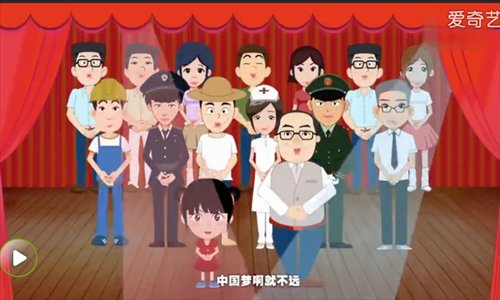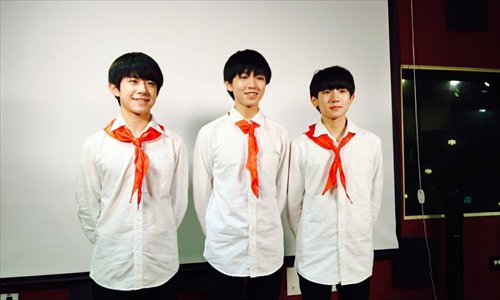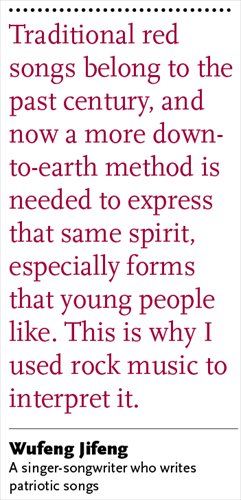China adopts pop songs, rock to instill patriotism in youth
Govt adopts popular culture to instill patriotism in youth
As China's millennial generation and people born after 2000 grow up and start to play an increasingly important role in Chinese society, the government and the Party are harnessing pop idols, Internet slang and new media to attract a younger following. This has also prompted musicians to pen modern versions of revolutionary "red songs."

A screenshot of the animated rap video "Four Comprehensives," produced by the Xinhua News Agency
Catchy jingles, a jumping cartoon version of President Xi Jinping, and middle-aged man rapping about China's latest development plans are just a few ways the government is promoting its policies and national ideology.
An animated rap video produced by the Xinhua News Agency, which explains the Four Comprehensives, a list of political goals for China advocated by President Xi, went viral last month. In the video, a man explains the goals to a girl as they rap and boogie to an upbeat tune.
Since late 2013, a series of animated videos, patriotic pop songs and micro films appeared on China's social media platforms such as Weibo and WeChat, with themes ranging from publicizing government plans to lauding the country's prosperity.
These are not the only attempts the Chinese government has made in recent years to harness pop culture for its goals. The Central Committee of the China Communist Youth League (CCYL), for example, is using Internet slang, comics and mobile games to recruit members, and has invited boy band TFboys to become its ambassadors.
"China's millennial generation grew up with the Internet. Youngsters born after 2000 have an even greater dependence on the Internet. The Party and the central government is hoping to approach and influence these younger generations using their favorite forms such as animation," said He Hui, professor at the School of International Journalism and Communication, Beijing Foreign Studies University.

Pop band TFboys wear red scarves in a CCYL video. Photo: Courtesy of Baidu
Blurred background
The On Fuxing Road Studio was the first studio to use animation to promote government policies when it launched a 5-minute video explaining how Chinese leaders are chosen in October 2013. Of the seven videos it has released so far, three are about policymaking and the achievements of the Communist Party of China (CPC). The most recent one is "Shisanwu," an animated video which explains the government's 13th Five-Year Plan through a folk song performed in English by foreigners.
A spokesperson for On Fuxing Road Studio, who declined to be named, attributed their attempts to China's development and President Xi Jinping's call for more diversified methods of overseas publicity in 2013.
"If China had not been at this stage of development, no one will be interested in these videos. If our national leaders hadn't been encouraging these efforts, this won't be possible either," she told the Global Times in a telephone interview.
Although the On Fuxing Road Studio has not revealed its real identity, the capital's video production professionals believe it has official background.
The name of the studio itself is revealing - Fuxing Road, part of the extended Chang'an Avenue in west Beijing, is home to many ministries and government organizations such as the International Department of the Central Committee of the CPC.
Professor He said that since the Party and the government are still experimenting with these new forms, it's understandable that it wants to publish the videos through an ostensibly grass-roots organization to test the waters.
"Playing down its official background can also make the videos more amiable and acceptable, as opposed to the conventional, one-way Chinese publicity which is often too explicit and political," he told the Global Times.

Successors of communism
Animation and rap videos are not the only way the government is trying to attract a younger following. The CCYL, for example, is using young pop idols to unite its members - virtually all Chinese aged between 14 and 28.
Last June, for example, it invited boy band TFboys and popular singer Han Geng to cover "We are the Successors of Communism," a song written in 1961 which later became the anthem of the CCYL.
TFboys are the hottest pop band in China today, consisting of three young men born in 1999 and 2000, each with over 13 million followers on Sina Weibo, while Han Geng is a South Korea-trained Chinese pop singer. Statistics show that most of their fans are under 30 years old.
The song's music video was produced by Rao Jin, the Tsinghua graduate known for establishing Anti-CNN.com in 2008, a site which attempts to refute what Rao sees as false Western media reports about China. Han and TFboys, dressed in white shirts, are shown putting on red scarves and raising their hands in a salute. Basketball player-turned-entrepreneur Yao Ming and other famous personalities also appeared in the video.
After the CCYL Central Committee posted the video on its Weibo, it was shared over 465,000 times, making it the most popular Weibo post in the committee's history.
"If we use the proper youth idols in a proper way, we can help young people build a correct world view," Wu Dezu, director of the new media division at the CCYL Central Committee, said in an interview on CCYL's WeChat account.
Wu also revealed that CCYL's new media division was established at the end of 2013. "What we want to do is to spread positive energy in this age of new media, using ways that young people like, such as Weibo, WeChat, videos and animation, and present them fashionably," he said in the interview.
The song and video were not the only cooperation between the young idols and the CCYL. Last August, the organization invited TFboys to join its mobilizing meeting that asks young people to comment rationally and positively on the Internet and help create a "healthy online environment," where the three young men recited a manifesto on that theme.
In addition to the use of idols, mobile games, comics and Internet slang are used by the CCYL to try to keep up with the younger generation.
The CCYL's Hainan committee, for example, last November launched a mobile game that quizzes players about the "socialist core values," a dozen words promoted by the government including patriotism, prosperity and harmony.
Last December, the Weibo of the CCYL's school department published a comic entitled "I like how you pursue me while reciting socialist core values," about how a girl is impressed by her suitor's ability to recite the terms and then falls in love with him. Stuffed full of Internet slang and drawn in the style of Japanese manga, the post was another obvious example of how the CYLC is changing its style to draw in young followers.
Modern red songs
The production and popularity of some of these songs and cartoons have spurred the creative spirit of nationalistic grass-roots singers and songwriters.
In the past two years, the popularity of songs lauding the country and its achievements have been on the rise, taking a variety of forms.
On music streaming site QQ Music, for example, over 10 different songs have President Xi Jinping's nickname "Xi Dada" in their titles, with styles ranging from folk songs to disco. Most of these songs praise President Xi's anti-corruption campaigns and his personal style.
One of these grass-roots patriotic songwriters is Wufeng Jifeng, a singer-songwriter based in South China's Guangdong Province, who recently wrote a song entitled "As you wished," dedicated to former Chinese Premier Zhou Enlai and praising China's prosperity.
Wufeng calls himself a ziganwu, or self-motivated Internet commenter who defends the government, and said his song is a modern spin on traditional red songs dedicated to revolutionary leaders.
"Traditional red songs belong to the past century, and now a more down-to-earth method is needed to express that same spirit, especially forms that young people like. This is why I used rock music to interpret it," he told the Global Times.
The title and lyrics of the song's chorus were inspired by one netizen's famous comment after China's massive military parade last September in WWII commemoration. The netizen, who uses the moniker "Zhou Gubei Dezhou," posted a picture of former Chinese Premier Zhou Enlai and commented, "This age of prosperity is as you wished." That post was shared over 920,000 times.
Unlike most rock songs, however, Wufeng's song rejects rebellion in favor of conformity. "Through this song I want to show collectivism and how common people are moved [by the country's achievement]," he said.
He wrote the lyrics with his cyber friend Cui Zijian, who in real life is a CPC publicity officer in the Bortala Mongol Autonomous Prefecture, Xinjiang Uyghur Autonomous Region.
"Animated songs [like "Shisanwu"] are very good attempts to approach the masses, but we cannot let the central government do everything. Grass-roots participation is equally important," Cui told the Global Times.
After a version of the song was uploaded on Weibo, it grabbed the attention of the Central Committee of the Communist Youth League of China, whose official Weibo account reposted the song.
Newspaper headline: Party pop